
Ethnoarchaeology
metrics 2024
Empowering Researchers: Your Resource for Groundbreaking Ethnoarchaeology
Introduction
Ethnoarchaeology, published by ROUTLEDGE JOURNALS, TAYLOR & FRANCIS LTD, stands at the forefront of interdisciplinary research within the realms of anthropology and archaeology. With an ISSN of 1944-2904 and an E-ISSN of 1944-2890, this journal has demonstrated an impressive impact, categorized in the Q1 quartile for both anthropology and archaeology as of 2023. Acknowledged for its influence, it ranks 72/413 in Archeology (arts and humanities) with an impressive 82nd percentile, making it a vital resource for researchers and practitioners. Over its converged years from 2014 to 2024, the journal aims to bridge theoretical and practical aspects of ethnoarchaeology, fostering a deeper understanding of cultural practices through archaeological perspectives. Its commitment to advancing knowledge in this unique field is of utmost importance for academics, professionals, and students dedicated to exploring the interplay between contemporary societies and historical archaeological practices.
Metrics 2024
 0.96
0.96 1.80
1.80 1.90
1.90 9
9Metrics History
Rank 2024
Scopus
JCI (Web Of Science)
Quartile History
Similar Journals
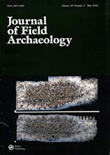
JOURNAL OF FIELD ARCHAEOLOGY
Unearthing Knowledge, Shaping the Future of ArchaeologyJOURNAL OF FIELD ARCHAEOLOGY, published by Routledge Journals, Taylor & Francis Ltd, is a premier scholarly publication dedicated to advancing the field of archaeology. With an impressive impact factor reflecting its significant contributions to both the arts and humanities, this journal ranks in the Q1 category for archaeology, with a remarkable position of #21/413 in the arts and humanities realm and #19/354 in social sciences, placing it in the 95th percentile among its peers. Catering to researchers, professionals, and students alike, the journal has continuously explored critical archaeological questions since its inception in 1974, with a commitment to disseminating high-quality research and innovative methodologies up to the present. Although it operates under a traditional access model, the journal engages a broad readership with its insightful studies and findings, making it an essential resource for anyone deeply involved in archaeology and its related disciplines.
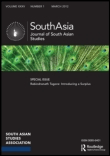
SOUTH ASIA-JOURNAL OF SOUTH ASIAN STUDIES
Fostering Insightful Perspectives on South Asia's HeritageSOUTH ASIA-JOURNAL OF SOUTH ASIAN STUDIES, published by Routledge Journals, Taylor & Francis Ltd, stands as a seminal platform for scholarly discourse in South Asian studies. With a proud history dating back to 1971, the journal provides a comprehensive examination of the region's multifaceted cultural, historical, and socio-political dynamics. Renowned for its rigorous peer-reviewed articles, it is listed in the prestigious Q1 category in Cultural Studies and History and has garnered respect across the social sciences, indicated by its competitive rankings in Development and Sociology and Political Science. Although it does not currently offer open access, the journal's influence is evident, boasting an impressive impact in its fields as indicated by its Scopus rankings, with a noteworthy 88th percentile in History. Targeted towards researchers, professionals, and students alike, SOUTH ASIA-JOURNAL OF SOUTH ASIAN STUDIES is essential for anyone seeking to deepen their understanding of South Asian complexities and contribute to ongoing academic conversations.
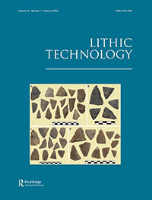
Lithic Technology
Revealing the Science Behind Ancient TechnologiesLithic Technology is a premier international journal published by Routledge Journals, Taylor & Francis Ltd, dedicated to advancing the field of lithic studies in archaeology and anthropology. Established in 1977, this prestigious journal has established itself at the forefront of research concerning stone tool technology, providing a vital forum for scholars to share groundbreaking findings and methodologies. With an impressive Q1 ranking in both Archaeology and Anthropology, and indexed within the 91st percentile in its respective categories by Scopus, Lithic Technology is recognized for its significant contributions to the understanding of human prehistory and material culture. The journal features a diverse array of articles, from theoretical approaches to practical case studies, ensuring relevance to contemporary archaeological discourse. Though not an open-access publication, its meticulous peer-review process guarantees the highest quality of scholarship, making it an indispensable resource for researchers, professionals, and students eager to expand their knowledge in the rigors of lithic analysis.
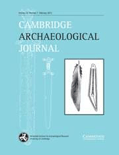
CAMBRIDGE ARCHAEOLOGICAL JOURNAL
Revealing Stories Through Archaeological ExcellenceThe Cambridge Archaeological Journal, published by Cambridge University Press, is a premier academic journal dedicated to archaeology and cultural studies. With an ISSN of 0959-7743 and an E-ISSN of 1474-0540, it has established itself as a leading platform since its inception in 1991, showcasing groundbreaking research that significantly contributes to our understanding of human history and cultural heritage. The journal currently ranks in the top quartile (Q1) across various categories, including Archaeology and Cultural Studies, underlining its impact and relevance in the field. The impact factor reflects its esteemed position, with Scopus ranks placing it within the 90th to 93rd percentiles among its peers. Researchers, professionals, and students alike benefit from its insightful analyses and interdisciplinary approaches, making it an essential resource for advancing knowledge in archaeology and related fields. The journal is based in the United Kingdom, at the Edinburgh Building, Shaftesbury Rd, CB2 8RU, Cambridge, England, and continues to drive scholarly conversations through its commitment to excellence and innovation in archaeological studies.
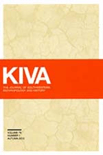
Kiva-Journal of Southwestern Anthropology and History
Diving Deep into Southwestern NarrativesKiva - Journal of Southwestern Anthropology and History is a distinguished academic journal published by Routledge Journals, Taylor & Francis Ltd, that serves as a vital resource for scholars in the fields of anthropology, archaeology, and history. With an ISSN of 0023-1940 and an E-ISSN of 2051-6177, this journal has established itself as a significant avenue for scholarly communication since its inception in 1964. It consistently ranks in the top quartiles, including Q1 in Archaeology and Q2 in Anthropology, reflecting its high impact and rigorous peer-review process. Covering a wide array of topics pertinent to the Southwestern United States, Kiva invites original research articles, reviews, and methodological papers that advance understanding of the region's rich cultural heritage and historical narratives. While currently not open access, its commitment to disseminating quality research makes it an essential reading for researchers, professionals, and students aiming to explore the multifaceted dimensions of southwestern studies.

Intersecciones en Antropologia
Unlocking the richness of human experience.Intersecciones en Antropologia, published by the Universidad Nacional del Centro de la Provincia de Buenos Aires (UNICEN), Facultad de Ciencias Sociales, is a premier open-access journal in the field of anthropology, having established its presence since 2010. With an impressive impact factor and currently holding the distinguished Q1 quartile ranking in anthropology for 2023, this journal has quickly become a vital resource for scholars and practitioners alike, offering a platform for innovative research and critical discussion. The journal aims to advance anthropological scholarship by encouraging the dissemination of diverse perspectives and stimulating dialogue across geographical and cultural boundaries. Its open-access model, adopted in 2017, ensures that valuable research findings are accessible to a global audience, fostering collaboration and engagement within the academic community and beyond. Located in the vibrant cultural context of Argentina, Intersecciones en Antropologia serves as a conduit for significant anthropological dialogues, making it an essential read for those dedicated to understanding and contributing to the evolving landscape of social sciences.

Origini
Advancing Archaeological Insights and Innovations.Origini is a distinguished journal dedicated to the field of archaeology, published by EDIZIONI QUASAR S TOGNON SRL in Italy. With an ISSN of 0474-6805, it offers a platform for researchers and professionals to share their latest findings and insights. Having achieved a significant Q2 ranking in both Archaeology (Arts and Humanities) and Archaeology (Social Sciences) categories according to Scopus, it positions itself as a respected source of scholarly communication in the discipline. Over the converged years from 2017 to 2023, Origini has consistently aimed to advance archaeological research, fostering an environment where innovative theories and methodologies can be developed and discussed. Although it is not an Open Access journal, its contributions remain vital for academics and students seeking to deepen their understanding of archaeological practices and historical narratives. With a commitment to excellence, Origini stands as an essential resource within the archaeological community, inviting contributions that push the boundaries of knowledge and interpretation.

Archaeology Ethnology and Anthropology of Eurasia
Bridging Disciplines to Uncover Eurasian NarrativesArchaeology Ethnology and Anthropology of Eurasia, published by PLEIADES PUBLISHING INC, is a leading academic journal that spans the fields of archaeology, ethnology, and anthropology, with a distinct focus on the Eurasian region. Since its inception in 2006, the journal has consistently aimed to foster interdisciplinary dialogue and innovative research, contributing significantly to our understanding of cultural interactions, historical dynamics, and social transformations in this diverse area. With a prestigious Q1 ranking in both Archaeology and Cultural Studies categories, it holds a strong position in the academic community, underscored by its Scopus rankings placing it in the top quartile of both fields. The journal is dedicated to promoting high-quality scholarly articles that advance knowledge and stimulate critical thinking among researchers, professionals, and students alike. Although it operates within a subscription model, the essence of its open dialogue and knowledge dissemination resonates through its accessible content. Join a vibrant community of scholars and delve into the intricate tapestry of Eurasian cultural heritage through this esteemed journal.
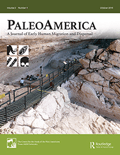
PaleoAmerica
Exploring the Depths of Ancient American LifePaleoAmerica, published by Routledge Journals, Taylor & Francis Ltd, is a leading academic journal dedicated to advancing the study of ancient peoples of the Americas. With a strong presence in the fields of archaeology, ecology, and paleontology, this journal holds Q1 rankings in its respective categories for 2023, reflecting its exceptional impact and relevance in academia. Covering a broad spectrum of topics related to human and ecological evolution from 2015 to 2024, PaleoAmerica serves as a vital resource for researchers, professionals, and students eager to explore pivotal findings and theories related to the prehistoric populations of North and South America. While the journal operates under a subscription model, its comprehensive scope and high-quality peer-reviewed articles make it indispensable for those engaging with the complex narratives of ancient American life.

Anthropologie-International Journal of Human Diversity and Evolution
Illuminating the Spectrum of Anthropological ResearchAnthropologie-International Journal of Human Diversity and Evolution is a prominent peer-reviewed journal published by the esteemed MORAVIAN MUSEUM in the heart of the Czech Republic. With a focus on anthropology, this journal serves as a vital platform for the dissemination of innovative research that explores human diversity and evolutionary studies. The journal operates under a rigorous academic framework and is categorized in the Q3 quartile for anthropology in 2023, reflecting its significance in the field. Although it does not currently offer open access options, Anthropologie facilitates the exchange of knowledge through its carefully curated articles spanning diverse topics within human evolution. Its Scopus ranking (320 out of 502 in social sciences) underscores its role as a relevant source for scholars and professionals alike, fostering dialogue and advancements in understanding human diversity. Researchers, students, and practitioners can look forward to engaging content that not only enlightens but also inspires further inquiry into anthropological studies.